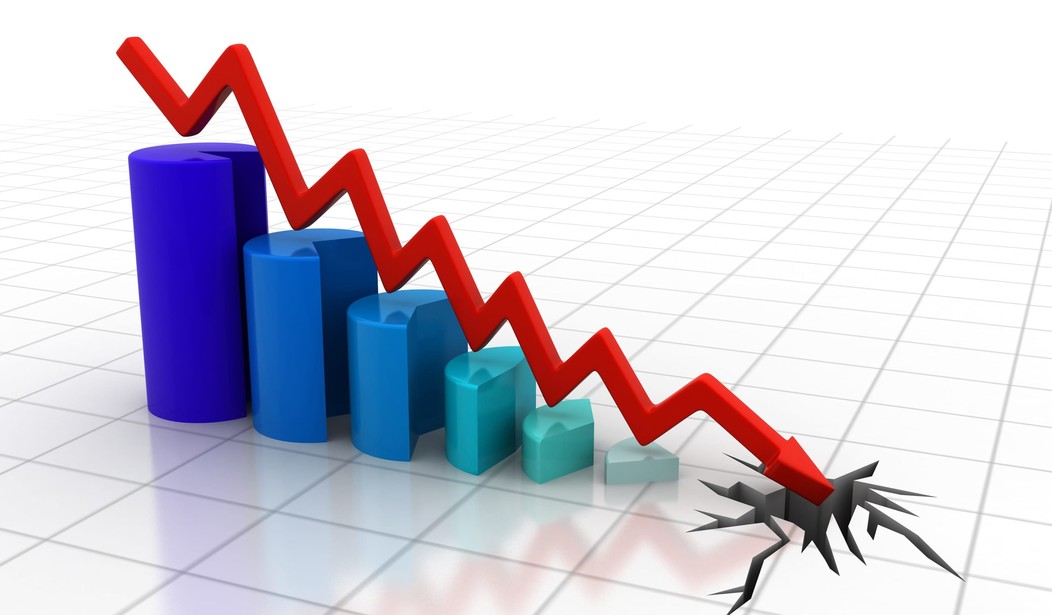The economy has been struggling in the first four months of this year, and it has been worse than the Obama economy’s new normal. The rate of economic growth — already sluggish — fell to 0.5 percent, and the new jobs added in April fell to a 7-month low. While this decline is nothing to celebrate, it might strengthen the presumptive Republican nominee Donald Trump in his race against Obama’s third term.
Worse, the Bureau of Labor Statistics (BLS) had to correct the job growth numbers from February and March. At the end of those months, BLS said 245,000 and 215,000 jobs were created, respectively. It turns out that they overestimated by 19,000 jobs: in February the real number was 233,000 and in March it was 208,000.
Meanwhile, the official unemployment rate went down, because more people are giving up on work. In January, a report found that 40 percent of Americans who are capable of working but lack employment have given up the job search entirely. This is why the 5 percent unemployment rate — unchanged from March — is not credible. Yes, fewer people without a job are looking for work, but more people have given up on employment in general.
Hiring in April fell to 160,000 new jobs, far below the average of 282,000 per month in the last quarter of last year. There was one silver lining for those already with a job, however — average wages climbed 0.3 percent to $25.53 an hour. Hourly pay rose 2.5 percent in the past 12 months, which suggests employers are finding fewer skilled workers but also that even those shifted from full-time to part-time work by Obamacare are experiencing a very slight raise.
Interestingly, women gained 87 percent of jobs in April, narrowing the (already small) employment gap between men and women.
Women gained 87% of jobs added last month. Of 160k jobs added, men gained 21k, women 139k #JobsReport pic.twitter.com/KVy4RMlurW
— IWPR (@IWPResearch) May 6, 2016
Nevertheless, the situation is unlikely to improve the current mood of economic doubt which fuels voters on both sides of the aisle. The presumptive Republican nominee, Donald Trump, has railed against bad trade deals which allegedly take jobs overseas (the astronomically high corporate tax rate doesn’t help either). Meanwhile, the stalwart Democratic underdog Bernie Sanders continues to fight, insisting that things are very bad for workers and good for millionaires and billionaires (he is a de-facto millionaire himself).
Things are not good for businesses, however. Gross domestic product in the first three months of this year rose by only 0.5 percent. China’s financial struggles, along with the fall in the price of commodities — especially oil — has led to turmoil in global markets, leading businesses to invest less, even as household purchases rose.
Nonresidential fixed investment, the fancy term for companies spending money on new equipment, structures, and intellectual property, dropped at a 5.9 percent annualized rate, the biggest decline since the spring of 2009. Part of this decline in business investment traces to the oil industry, where the dropping price of oil led to an 86 percent annualized drop in spending on wells and shafts, the largest drop in fossil fuel investment since 1958.
One major reason for the fall of business investment is the drop in demand for new products, both in domestic and foreign markets. Companies are struggling to trim their inventories, which subtracted 0.33 percentage point from overall economic growth — an increase in their 0.22 percent drag on growth in the last three months of 2015. Trade also shrunk in the first three months of 2016, subtracting 0.34 percent point from overall growth.
Next Page: What does this mean for November?
Ironically, the promises of the populist candidates, Sanders and Trump, to cut down on trade deals so other countries do not “take advantage” of the United States carries the potential to depress that trade even further. Nevertheless, economic troubles like these do not bode well for the Democratic Party, as political science suggests fundamentals like a struggling economy lead voters to oust the party in power.
Declining economic growth may be enough to offset the slight increase in President Obama’s approval rating, giving Republicans the political advantage in November.








Join the conversation as a VIP Member